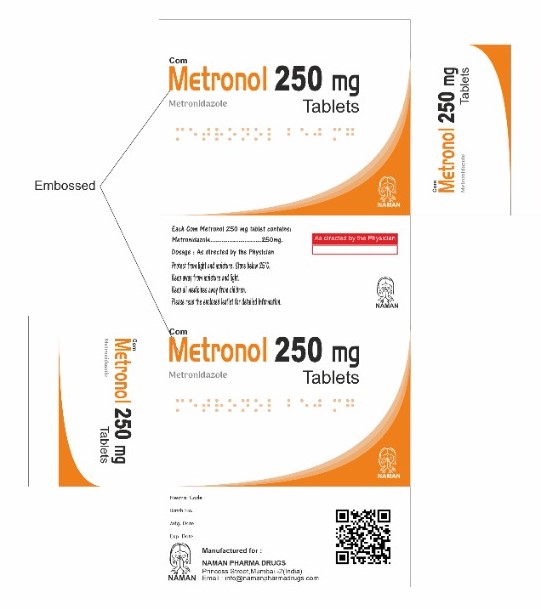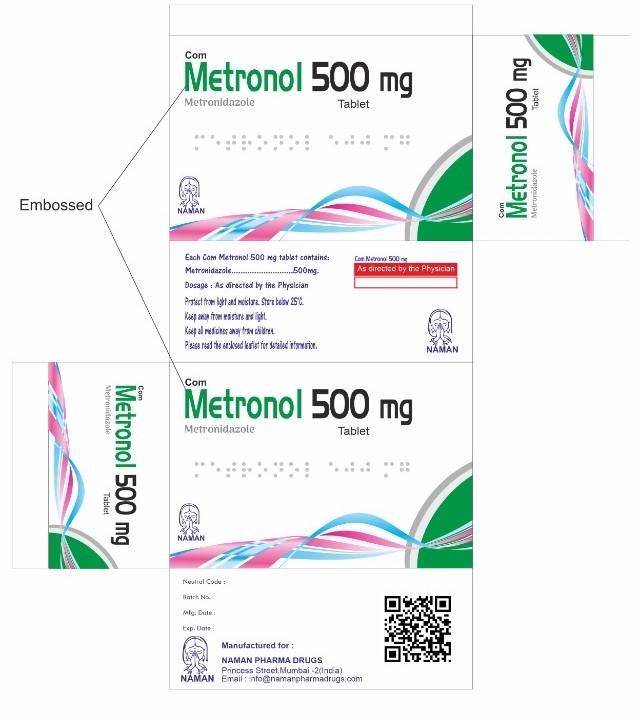Metronol – Metronidazole 250mg Tablet
Metronol – Metronidazole 500mg Tablet


Each Com Metronol 250 mg Tablet contains :
Metronidazole 250mg.
Dosage : As Directed by Physician .
Protect from light and moisture , Store below 25’C.
Keep all medicines away from children.
Please read the enclosed leaflet for detailed information.
Each Com Metronol 500 mg Tablet contains :
Metronidazole 500 mg.
Dosage : As Directed by Physician .
Protect from light and moisture , Store below 25’C.
Keep all medicines away from children.
Please read the enclosed leaflet for detailed information.
Metronidazole is an antibiotic and antiprotozoal medication commonly used to treat various bacterial and parasitic infections. It’s available in different forms, including oral tablets, capsules, topical creams, gels, and intravenous solutions. Metronidazole is effective against a wide range of microorganisms, including bacteria and protozoa.
Here are some common uses of metronidazole:
1. Bacterial Infections: Metronidazole is often prescribed to treat bacterial infections in different parts of the body, including the stomach, intestines, skin, joints, and respiratory tract. It is effective against certain anaerobic bacteria, which are bacteria that can survive and thrive in environments without oxygen.
2. Protozoal Infections: Metronidazole is also used to treat various protozoal infections, such as giardiasis (caused by Giardia lamblia), trichomoniasis (caused by Trichomonas vaginalis), and amoebiasis (caused by Entamoeba histolytica).
3. Bacterial Vaginosis: Metronidazole is a common treatment for bacterial vaginosis, a vaginal infection caused by an overgrowth of certain bacteria.
4.Dental Infections: Dentists may prescribe metronidazole to treat oral infections and periodontal diseases caused by certain bacteria.
5. H. pylori Eradication: It is used as part of a combination therapy to treat Helicobacter pylori infections, which can cause stomach ulcers and gastritis.
6. Inflammatory Bowel Disease: Metronidazole is sometimes used in the management of inflammatory bowel disease (IBD), such as Crohn’s disease and ulcerative colitis, to reduce inflammation and control symptoms.
It’s important to take metronidazole as prescribed by your healthcare provider and to complete the full course of treatment, even if you start feeling better before the medication is finished. Not doing so can lead to the development of antibiotic resistance.
Common side effects of metronidazole may include nausea, vomiting, diarrhea, metallic taste in the mouth, and dizziness. It can interact with certain medications and alcohol, so it’s important to inform your healthcare provider of any other drugs you are taking and avoid alcohol during the course of treatment.
As with any medication, it’s crucial to use metronidazole only under the guidance and supervision of a healthcare professional to ensure proper treatment and minimize potential side effects or complications.
